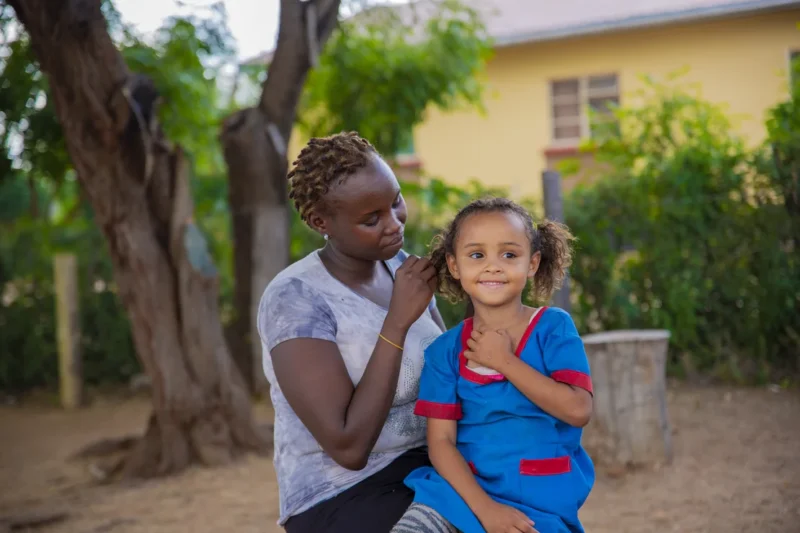Seventeen-year-old Marian Pannalossy cuts a striking figure wherever she goes in Archer’s Post, a small town 200 miles north of Nairobi. She lives alone and is light-skinned in a place where mixed-race people are a rarity and therefore ostracized.
“They call me ‘mzungu maskini,’ or a poor white girl,” she told CNN at her single-room house, a tremor in her voice. “They always say ‘Why are you here? Just look for connections so that you can go to your own people. You don’t belong here. You’re not supposed to be here suffering.’”
Marian believes that her father was a British soldier, but she has never met him. She does not even know his name.
Marian is among a group of mixed-race children whose mothers say they were conceived after rape by British soldiers training in Kenya. Her mother, Lydia Juma, was among hundreds of Kenyan women who filed complaints with the UK military over the years, as documented by Kenya’s human rights body.
“I don’t know why God is punishing me. I don’t understand,” Juma said through tears in a powerful 2011 documentary, ‘The Rape of the Samburu Women.’
Marian, aged four at the time, sat on her lap, sometimes hugging her mother as she wept and recounted how she was violated and the suffering she had endured since.
Juma’s live-in boyfriend, with whom she had two older children, left her after she gave birth to Marian, a mixed-race child, because rape is a taboo in their culture. “The moment he saw that the child is ‘white,’ he went, and he went forever,” she said in the film.
Juma died two years after that interview without ever finding the man she says raped her.
Mixed-race children continue to be born in the remote villages where the British Army trains its soldiers in Kenya. The British Army Training Unit, Kenya (BATUK), is headquartered in the town of Nanyuki, about 70 miles southwest of Archer’s Post.
BATUK is currently under investigation by the Defense, Intelligence and Foreign Relations committee of Kenya’s National Assembly.
It has held public hearings in several areas where British troops train and heard a litany of complaints about abuse, exploitation, and sexual assaults from communities around them.
It intends to hear from BATUK officials and the British High Commissioner to Kenya at the end of its work later this month, according to a schedule shared with CNN.
One of the more contentious accusations against British soldiers involves the case of Agnes Wanjiru.
Wanjiru, a 21-year-old Kenyan woman, vanished in 2012 after entering a hotel with British soldiers, according to reports.
Her body was later found in a septic tank. Despite a Kenyan inquest ruling her death a murder and the reported identification of a suspect by fellow soldiers, the British soldier allegedly involved hasn’t faced charges.
Wanjiru’s family believes British officials are indifferent to her case and pleaded with the King for help during his visit to Kenya.
A British High Commission spokesperson said it takes all allegations raised by the community seriously and it will ensure thorough investigations.
“All sexual activity which involves the abuse of power, including buying sex whether in the UK or abroad, is prohibited,” the British High Commission, speaking on behalf of BATUK, said in a statement to CNN.
“We are committed to preventing sexual exploitation in any form and investigate and hold to account any Service Personnel found to be involved in it.”
‘British boys behaving badly’
Britain pays Kenya about $400,000 a year to allow its soldiers to train in the East African country, mostly in the expansive wildlife conservancies in Laikipia and Samburu counties.
Kenya renewed the defense pact in 2021 despite strong local opposition. BATUK has a permanent training base in Nanyuki, to the south of those wildlife conservancies, with 100 full-time staff.
The Defense, Intelligence and Foreign Relations committee’s work has renewed scrutiny of the British Army’s operations in Kenya and once again brought attention to the cases of the women who have accused soldiers of rape over several decades.
Allegations of rape and other crimes, including murder, by British soldiers deployed there date back to the 1950s.
“This to us is an example of British boys behaving badly,” said Marion Mutugi, a commissioner for the Kenya National Commission on Human Rights.
“This is a matter of taking care of the vulnerable in our society who our constitution says require special protection.”
She’s referring to hundreds of women from the mostly pastoralist Maasai and Samburu communities who accused the British Army of rapes in the 1970s and 80s.
They were represented by the British lawyer Martyn Day in a landmark civil case in London in the early 2000s.
Ntoyie Lenkanan, 72, was among the complainants in the British case.
Nearly forty years later, her voice trembles with emotion and barely controlled anger as she recounts her ordeal.
